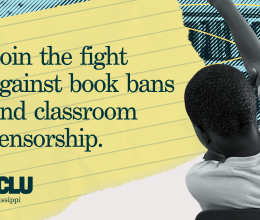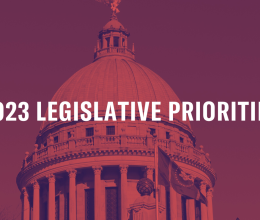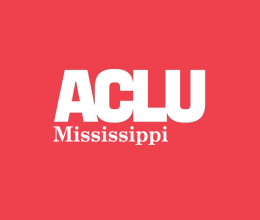JACKSON, MISS. - Today, a federal judge ruled in favor of educators and students who are challenging certain provisions of Mississippi’s anti-DEI law, House Bill 1193, holding that the provisions violate the First and Fourteenth Amendments by prohibiting public school discussions of race, sex, gender identity, sexual orientation, national origin, and other forbidden subjects in all of the state’s public universities, colleges, and K-12 schools.
At a hearing last week, the teachers and students --- represented by the Mississippi Center for Justice (MCJ), the ACLU of Mississippi, Badat Legal, and Quinn, Connor, Weaver, Davies & Rouco LLP --- urged Judge Henry T. Wingate to issue a Preliminary Injunction that would extend the Temporary Restraining Order he had imposed against the provisions on June 20. Judge Wingate issued the Preliminary Injunction today, which is slated to stay in place until the Judge can conduct a trial on the merits and a final review likely in several months or even as late as a year.
“We are pleased that this law is preliminarily enjoined,” said Joshua Tom, legal director at the ACLU of Mississippi. “The State’s attempt to impose its preferred views - and ban opposing views – on Mississippi’s public education system is not only bad policy, it’s illegal, as the Court has preliminarily found today.”
“Thankfully, this puts to rest for now the concerns springing up among administrators, teachers, and students around the state, wondering how they could suddenly stop teaching and learning about issues that have long been essential to a complete education in courses like history, biology, literature, and many others,” said Rob McDuff, attorney and director of the Mississippi Center for Justice George Riley Impact Litigation Campaign.
The broad prohibitions in the challenged provisions could have banned discussions of slavery, the Civil War, the civil rights movement, the women’s rights movement, discrimination in a wide array of forms, and other fundamental aspects of American history and contemporary life. They could have led to the removal of classic literary works from curricula and libraries, prevented constitutional law professors from teaching about the Fourteenth Amendment, and banned discussions about sex in biology courses.
The ruling protects educators and students from the chilling effect of these bans and the vague language in some of them, making it difficult to discern what is prohibited and permitted.
“It is an enormous relief that the court has sided with academic freedom, free speech, and due process in its recent decision,” said Deanna Kreisel, Associate Professor of English at the University of Mississippi and a member of the United Campus Workers, one of the Plaintiffs in this case. “The fight is not over, but at least for the time being, the students of Mississippi can continue to learn in an environment free of ideological constraints and partisan censorship.”
“The Court's decision today ensures that our educators and students will begin school this fall with their First Amendment protections intact, and with the knowledge that they can teach and learn the truth in Mississippi's public schools,” said Amir Badat, civil rights and racial justice attorney based in Mississippi. “We will continue the fight against the State's attempt to censor our public schools and deprive our youth of a quality education.”
The provisions opened the door to harsh penalties, including potential termination for teachers, suspension of students, and loss of state funding for entire schools and school districts. The law also included a complaint process, which would have allowed ideological attacks on teachers and students.
The decision blocking these provisions comes as other anti-DEI laws face constitutional challenges across the country, although none with the same sweeping ban on teaching race, sex, and similar subjects that Mississippi adopted.
Read the full complaint here.








